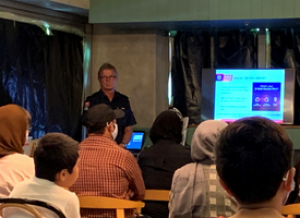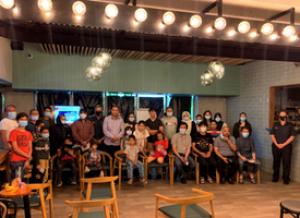Building trust and understanding with evacuees
23 Poutūterangi 2022
In Spring last year, Auckland City Station attended what appeared to be a routine callout to an accommodation building in the city. Senior Firefighter Greg Jefferson noticed there were a lot of security guards but few occupants in the evacuation area and questioned why that was. The answers he received led to a new fire safety initiative that will undoubtedly save lives.
The building was a secure place for Afghanistan evacuees, who had assisted the New Zealand Defence Force in Afghanistan. For them, alarms and uniforms were something to be feared, which is why so many, including children, had not evacuated the building. Greg Jefferson saw an opportunity to help this brave and at-risk group.
“I talked to the security company who ran the facility and various government departments, to see if we could share fire safety knowledge with the group and help build trust with emergency services. They responded positively and we gave our first presentation at the end of October,” said Greg.
Three presentations were held under the orange traffic light setting and the response was excellent. Auckland City Station Officer Ali Rodger said over 200 people attended.
“Each presentation saw more and more people coming along. They learned about fire safety and Greg also took the time to assure them our uniformed emergency services were here to help, not harm them,” said Ali.
While presentations have been temporarily halted, it’s hoped they’ll begin again soon, with smaller numbers and other safety measures in place. Work is also underway to translate the materials into the Afghanistan language, Dari.
“Another 700 Afghanistan evacuees are due to arrive here in the coming months. We owe these people a great deal and the least we can do is help make them safer for their new lives in Aotearoa,” said Ali.
 |
 |













